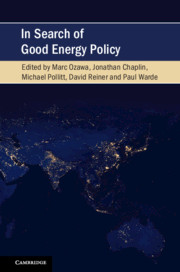Book contents
- In Search of Good Energy Policy
- In Search of Good Energy Policy
- Copyright page
- Contents
- Figures
- Tables
- Contributors
- Acknowledgments
- 1 Introduction
- Part I Multidisciplinary Perspectives
- 2 Political Science and Energy
- 3 Economics – The Proper Valuation of Security and Environment
- 4 Good Energy: Philosophical Perspectives
- 5 Public Theology – ‘Grounded’: An Energy Policy Rooted in Human Flourishing
- 6 Anthropology and Energy Policy
- 7 History: A Long View?
- 8 Management – From the Drawing Board to Successful Delivery
- 9 Legal Aspects of Energy Policy
- Part II Cases and Multidisciplinary Responses
- Part III Multidisciplinary Cases
- Index
- References
6 - Anthropology and Energy Policy
from Part I - Multidisciplinary Perspectives
Published online by Cambridge University Press: 10 June 2019
- In Search of Good Energy Policy
- In Search of Good Energy Policy
- Copyright page
- Contents
- Figures
- Tables
- Contributors
- Acknowledgments
- 1 Introduction
- Part I Multidisciplinary Perspectives
- 2 Political Science and Energy
- 3 Economics – The Proper Valuation of Security and Environment
- 4 Good Energy: Philosophical Perspectives
- 5 Public Theology – ‘Grounded’: An Energy Policy Rooted in Human Flourishing
- 6 Anthropology and Energy Policy
- 7 History: A Long View?
- 8 Management – From the Drawing Board to Successful Delivery
- 9 Legal Aspects of Energy Policy
- Part II Cases and Multidisciplinary Responses
- Part III Multidisciplinary Cases
- Index
- References
Summary
Energy and its management through policy touches on some core anthropological topics such as power, value and identity. Innovative anthropological approaches are being used to reveal the interplay between energy and societies. These include ethnographies of communities and their relationship to energy resources, analysis of the material culture of homes, as well as new areas of research into digital systems. This chapter outlines the questions that energy policy raises for anthropologists as well as current approaches being used to investigate them.
- Type
- Chapter
- Information
- In Search of Good Energy Policy , pp. 69 - 75Publisher: Cambridge University PressPrint publication year: 2019



